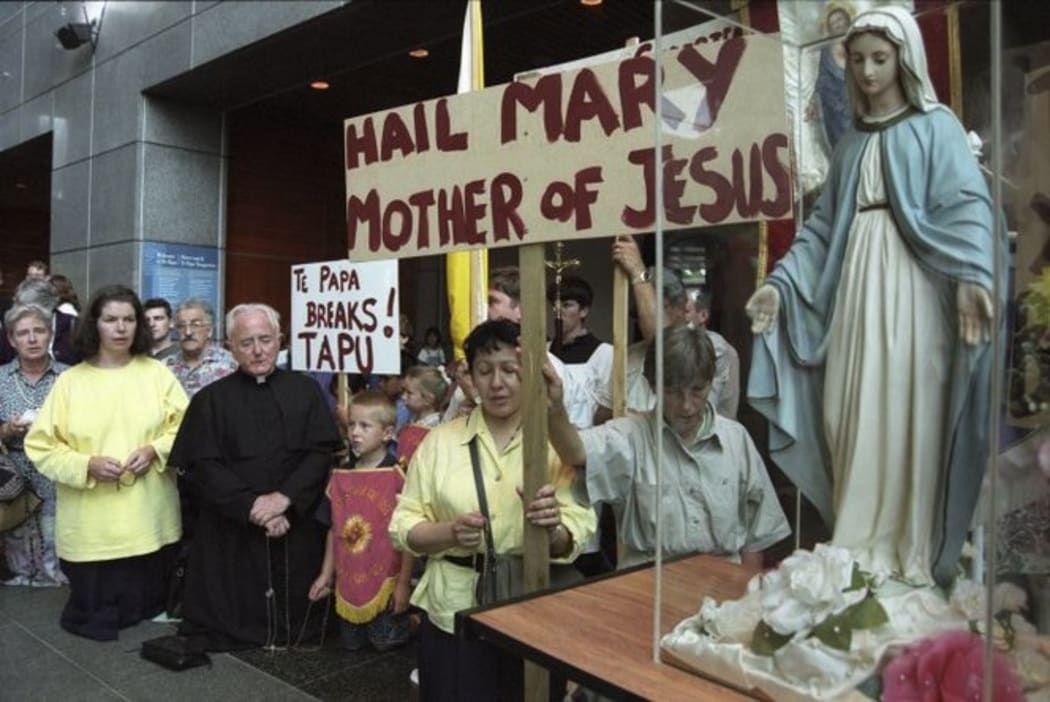The Government has refused to add a blasphemy repeal to a bill eliminating redundant laws, ...partly because it is obsolete.

People outside Te Papa Museum protest in 1998 about Tania Kovats' 'Virgin in a condom' exhibit in Wellington, after the Museum refused to remove it. Photo: The Dominion Post Collection, Alexander Turnbull Library.
The Statutes Repeal Bill, which is in the process of becoming law, aims to clean up the statute books. By repealing or partially repealing “132 Acts that are no longer needed because they no longer have any actual effect, have very limited effect, or are designed to achieve regulatory outcomes that are no longer relevant.”
This week it was being debated by the Committee of the Whole House.
This is a stage where amendments can be made to legislation and one change proposed by Labour’s Chris Hipkins was to add the repeal of section 123 of the Crimes Act 1961, thus removing blasphemous libel as an offence.
The Supplementary Order Paper proposing the amendment noted that “this provision is anachronistic and has fallen into disuse. The overwhelming opinion of churches and religious groups is that faith does not need statutory protection of this kind. Amending the law in this way is a more efficient use of the House’s time than alternative approaches, such as a member’s bill.”
In advance of the debate there was suggestion that such a repeal was likely to “receive fairly widespread support from the House.”
But when the House reached that part of the debate it became obvious that in fact the government was against that inclusion.
Speaking for the Government Paul Foster Bell declared himself “completely opposed to the idea that any form of thought or crime of thought, or of speech or of conscience, should remain part of our criminal code on an ongoing basis. … It is archaic that a country like New Zealand should prohibit speech of any sort in the way we are in section 123 of the Crimes Act, with a threat of imprisonment for those who commit blasphemy.”
But he said that a repeal of blasphemous libel had not been in the bill at the stage where submissions were invited from the public and because it might be controversial, it deserved the opportunity for public input and it should not be included now without that process.
He also, ironically noted that it wasn’t necessary to hurry a repeal of the law because the last attempted prosecution was nearly a century ago - and even then was unsuccessful.
Chris Hipkins said that five further acts were added to the repeal list after the select committee stage, arguing against the submissions argument; and that the second argument (that it was not longer used) meant the law fell squarely into Paul Foster Bell’s own definition of laws to be repealed, those he has described as “obsolete and unnecessary legislation that can be safely repealed without unintended consequences.”
The Law in Question
Blasphemous Libel is listed as an offence under the Crimes Act 1961, under the heading 'Crime against religion'.
- Every one is liable to imprisonment for a term not exceeding 1 year who publishes any blasphemous libel.
- Whether any particular published matter is or is not blasphemous libel is a question of fact.
- It is not an offence against this section to express in good faith and in decent language, or to attempt to establish by arguments used in good faith and conveyed in decent language, any opinion whatever on any religious subject.
- No one shall be prosecuted for an offence against this section without the leave of the Attorney-General, who before giving leave may make such inquiries as he or she thinks fit.
The last and only formal prosecution under Section 123 was in 1922 - a jury found the defendant not guilty.
Recent attempts to seek prosecution under the law are in 2005 (over an Episode of South Park), and in 1998 (over the exhibition of Tania Kovats’ ‘Virgin in a Condom’ art work at Te Papa). In the latter case it was an MP (John Banks) who called on the Attorney General to prosecute.


